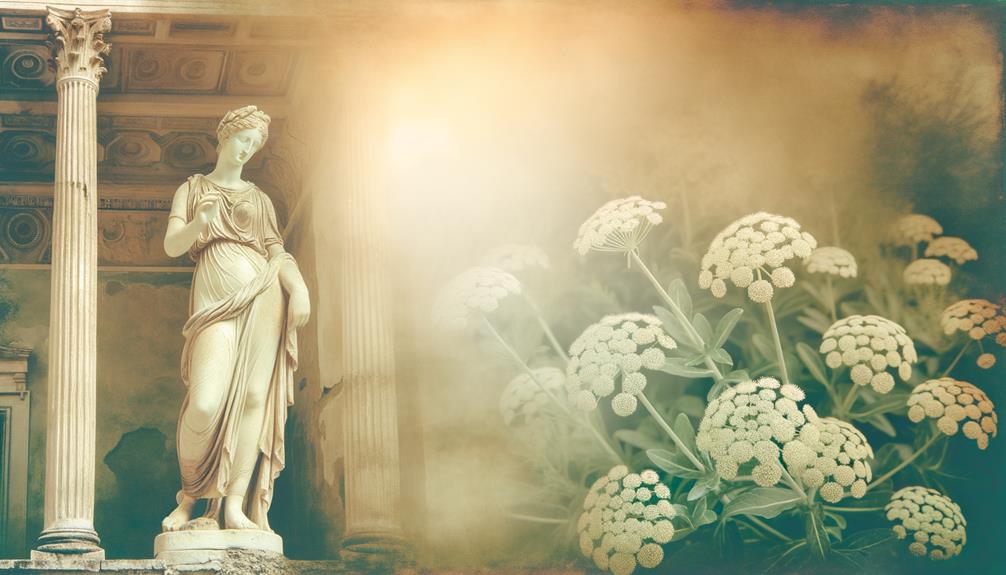Valeria Name Meaning and Origin
The name Valeria, steeped in Roman heritage, derives from the Latin verb 'valere,' signifying 'to be strong' or 'healthy.' Historically, it was associated with the prominent Gens Valeria family, which included influential figures such as consul Valerius Publicola. The name has sustained its cultural significance through centuries, featuring noteworthy bearers like Empress Valeria Messalina and Saint Valeria of Milan.
Valeria's usage spans various cultures, particularly within Italian, Spanish, and Slavic communities, and it remains prominent in literature, film, and media. Exploring further will uncover the name's rich historical and cultural narratives.

Key Takeaways
- Valeria is derived from the Latin verb 'valere,' meaning 'to be strong.'
- It is the feminine form of the Roman family name Valerius.
- The name has historical roots in the Roman Republic, linked to the noble Gens Valeria.
- Valeria has significant cultural resonance in Italian, Spanish, and Slavic regions.
- Notable historical figures include Roman Empress Valeria Messalina and Saint Valeria of Milan.
Historical Background
Tracing its roots back to ancient Rome, the name Valeria has a rich historical background that reflects its long-standing cultural significance.
Originating during the Roman Republic, Valeria was a prominent family name, or nomen, borne by one of the oldest patrician families, the Gens Valeria. This gens produced notable figures, such as the consul Valerius Publicola, known for his contributions to early Roman law and governance.
The name also carries historical weight through its association with various female figures of antiquity, who held significant social and political influence.
Valeria's extensive use over centuries underscores its enduring presence within Roman society, marking it as a name of considerable historical import and one deeply interwoven with the fabric of early Roman civilization.
Etymology
Building upon its historical background, the etymology of the name Valeria reveals its Latin origins, derived from the verb 'valere,' meaning 'to be strong' or 'to be healthy.' In Spanish culture, the name Valeria has connotations of strength and health. The name has also been associated with the color green, which symbolizes growth and vitality. In fact, in the esmeralda name meaning, the color green is often associated with harmony and balance. Overall, the name Valeria embodies a sense of resilience and well-being.
The name Valeria is the feminine form of the Roman family name Valerius, which was borne by several notable figures in ancient Roman history. The root word 'valere' itself underscores characteristics of fortitude and cruciality, qualities highly esteemed in Roman culture. The heena name meaning underlines the strength and importance associated with the name Valeria. It speaks to the resilience and significance that the name has carried through generations, embodying the spirit of its Roman origins. With its rich history and powerful connotations, Valeria continues to be a name celebrated for its enduring virtues.
The transformation of Valerius to Valeria exemplifies the linguistic practice of gender differentiation in Latin, where the 'us' ending typically denotes masculine names, and 'a' indicates feminine forms. This nomenclature reflects the broader societal values and linguistic structures of ancient Rome, where names conveyed both identity and aspiration.
Cultural Significance
The cultural importance of the name Valeria spans from ancient Roman times to contemporary societies, illustrating its enduring appeal and adaptability.
Originating from the Latin verb 'valere,' meaning 'to be strong' or 'to be healthy,' Valeria was a prominent name among Roman nobility. In early Christianity, Saint Valeria of Milan further solidified the name's religious and cultural relevance.
Across centuries, Valeria has transcended its classical roots, becoming a favored choice in various cultures, including Italian, Spanish, and Slavic societies. Contemporary use of the name in literature, film, and media highlights its ongoing resonance.
Therefore, Valeria's cross-cultural and historical presence underscores its timeless importance, reflecting strength and vigor in every epoch.
Popularity Over Time
The name Valeria has experienced fluctuating levels of popularity throughout different historical periods, often influenced by cultural and societal changes.
Remarkably, its popularity has varied substantially across geographical regions, reflecting diverse cultural embraces of the name.
Analyzing these trends reveals intriguing patterns of naming conventions and their evolution over time.
Historical Popularity Trends
Tracing the historical popularity trends of the name Valeria reveals significant fluctuations influenced by cultural, social, and regional factors. During the Roman Empire, Valeria was a prominent name among the nobility, reflecting its Latin origins. However, its usage waned during the Middle Ages, overshadowed by other names. A resurgence occurred in the Renaissance, driven by a renewed interest in classical antiquity. The 20th century saw another peak, largely due to cultural movements and popular media.
| Period | Popularity Level | Influencing Factors |
|---|---|---|
| Roman Empire | High | Nobility and classical roots |
| Middle Ages | Low | Dominance of other names |
| Renaissance | Moderate | Interest in antiquity |
| 20th Century | High | Cultural and media influence |
These trends underscore the name's enduring yet variable appeal.
Geographic Popularity Shifts
Examining the geographic popularity shifts of the name Valeria reveals how regional preferences and cultural exchanges have shaped its usage over time.
Originating from Latin, Valeria found early prominence in Roman society, symbolizing strength and valor.
During the medieval period, its usage waned in Western Europe but persisted in Eastern Orthodox regions.
The 19th century saw a resurgence in Italy, Spain, and Latin America, fueled by cultural revival movements.
By the late 20th century, Valeria gained popularity in the United States, reflecting Hispanic immigration patterns and broader cultural integration.
Today, its presence is robust in countries with Latin linguistic roots and continues to spread globally, adapting to diverse cultural contexts while retaining its classical essence.
Famous Namesakes
Notable individuals bearing the name Valeria include Valeria Messalina, the influential Roman Empress, and Valeria Golino, the acclaimed Italian actress and director.
Valeria Messalina, wife of Emperor Claudius, wielded considerable power in ancient Rome and is often remembered for her political machinations and dramatic downfall. Her life remains a subject of historical and literary intrigue.
In contrast, Valeria Golino has made significant contributions to contemporary cinema, earning acclaim through her diverse roles and directorial ventures. Golino's work spans various genres and languages, reflecting her versatility and artistic dedication.
Both women, separated by centuries, illustrate the enduring resonance and adaptability of the name Valeria across different epochs and cultural contexts.
Variations and Nicknames
The name Valeria exhibits several variations and nicknames across different cultures and languages, reflecting its widespread appeal and adaptability. Derived from the Latin word "valere," meaning "to be strong," Valeria has evolved into numerous forms. In different regions, it is adapted to suit phonetic and linguistic preferences, demonstrating its malleability. Below is a table highlighting some notable variations and nicknames.
| Variation/Nickname | Language/Culture |
|---|---|
| Valérie | French |
| Valeria | Italian, Spanish |
| Valeriya | Russian |
| Val | English |
| Lera | Slavic |
These variations and nicknames underscore the name's historical and cultural significance, illustrating its ability to transcend linguistic boundaries while preserving its core meaning.
Modern Usage
In contemporary settings, the name Valeria has experienced a resurgence in popularity among newborns, particularly in regions such as Latin America and Eastern Europe. This renewed interest can be attributed to its frequent appearance in media and pop culture, where it is often associated with strong, charismatic characters.
Additionally, global variations of the name, including Valérie in French and Valeriya in Russian, underscore its widespread appeal and adaptability.
Popularity Among Newborns
Over the past few decades, the name Valeria has seen a notable resurgence in popularity among newborns. This revival can be attributed to various factors, including its melodic sound and historical resonance. The name, which has Latin origins, is increasingly chosen by parents seeking a distinctive yet time-honored option for their daughters.
Key points contributing to its modern appeal include:
- Cultural Revival: Renewed interest in classical names.
- Global Appeal: Easily pronounced across different languages.
- Celebrity Influence: Adoption by public figures bolstering visibility.
- Literary References: Presence in historical and contemporary literature.
- Positive Connotations: Associated with strength and valor.
This combination of factors has firmly established Valeria as a favored choice in recent years.
Media and Pop Culture
Prominent within contemporary media and pop culture, the name Valeria frequently appears in television shows, films, and literary works, reinforcing its modern relevance and cultural resonance. Eminently featured in series such as 'Game of Thrones' and 'Narcos,' the name often denotes characters of strength and complexity. In literature, Valeria figures prominently in various novels, showcasing its timeless appeal and dynamic character potential.
| Media Type | Example Work | Character Traits |
|---|---|---|
| Television | Game of Thrones | Strong, Resourceful |
| Film | Valeria and the City of a Thousand Planets | Adventurous, Brave |
| Literature | Valeria in the Valley | Intelligent, Determined |
Thus, Valeria embodies a multifaceted persona, enriched by its diverse portrayals across media.
Global Name Variations
The name Valeria, frequently adapted across diverse cultures, showcases a rich tapestry of linguistic variations reflecting its enduring global appeal. Originating from the Latin 'Valerius,' meaning 'strong' or 'healthy,' Valeria has seamlessly integrated into numerous languages and regions, each adding its unique flavor. This cross-cultural resonance underscores the name's versatility and timeless nature.
- Valerie: Common in French-speaking countries, embodying a softer phonetic.
- Valeriya: A popular variant in Russia and Eastern Europe, maintaining the robust essence.
- Valéria: Favored in Portuguese and Hungarian contexts, emphasizing regional phonetic nuances.
- Valeria: Widely used in Italian and Spanish-speaking nations, retaining the original Latin form.
- Valerija: Found in Slavic countries, such as Croatia and Serbia, adding a distinctive regional twist.
This global adaptability highlights Valeria's broad cultural integration.
Conclusion
In summation, the name Valeria, rooted in ancient Roman heritage, carries a profound legacy that transcends mere nomenclature. Its etymology, derived from Latin, signifies strength and valor, attributes mirrored in its cultural significance and enduring appeal.
The name's historical resonance, underscored by notable figures and evolving popularity, encapsulates a rich tapestry of human experience. Valeria, a name of both antiquity and modern relevance, epitomizes the timeless intersection of language, culture, and identity.






